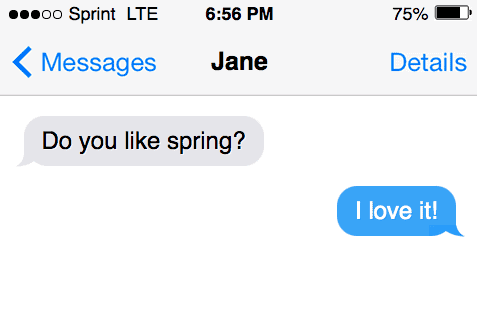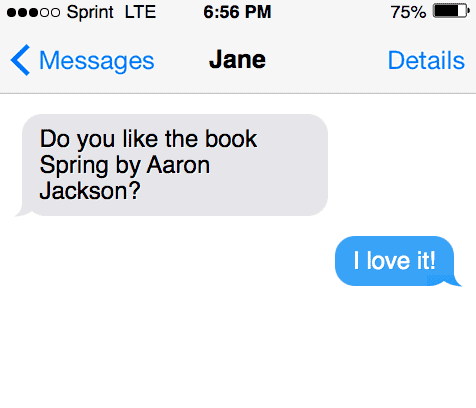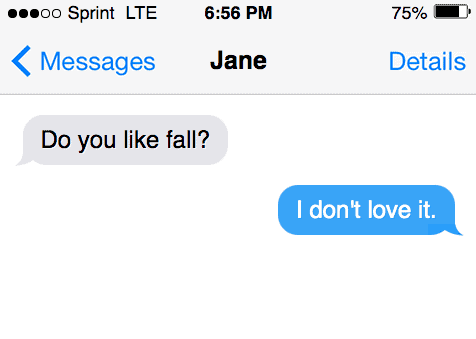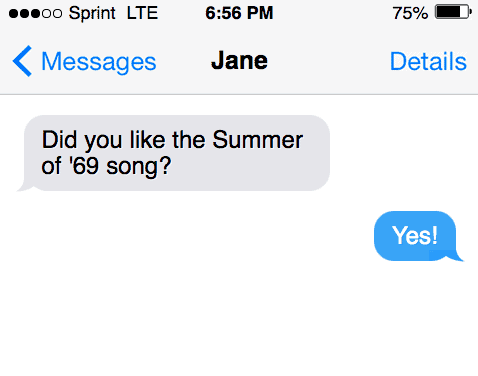Are winter, fall, spring, and summer capitalized? The days of the week are capitalized, and so are the months of the year. Based on this logic, it would be reasonable to assume that it’s proper grammar to capitalize seasons as well, right?
Then again, the morning, afternoon, and evening are all lowercase. Which grammar rule applies to the seasons?
Are seasons capitalized?
Keep reading to learn the proper capitalization rules, and which is grammatically correct in writing.
The short answer is no. Seasons are common nouns, and common nouns are not capitalized.
Common nouns, or general nouns do not require capital letters since they refer to general things, or broad categories (and not particular people or places.)
Proper nouns, on the other hand, name specific people, places, things and/or objects; and so require capitalization.
There are a few exceptions to this rule of grammar, which will get discussed.

Sentences using common nouns vs. proper nouns:
Look at the sentences below to better understand this general English language rule.
I prefer swimming in oceans rather than lakes.
Over spring break, we visited Crater Lake National Park in Oregon.
Susan prefers dogs over cats, as she thinks dogs are more amicable.
Winter is my favorite season of all the seasons.
Golden Retrievers are an exuberant and joyful type of dog breed.
I don’t like hiking up mountains because I have a tremendous fear of heights.
We have plans to climb Mount Everest next summer!
From the examples above, notice how each time a title, place, or proper name of a person is mentioned, the first letter of the word is capitalized. A part of differentiating a proper noun from a common noun is using lowercase and capital letters.

Capitalization Rules
Follow each capitalization rule for better writing:
Rule #1: Common nouns do not need to be capitalized.
The seasons are common nouns and do not require capitalization in most circumstances.
There are a few exceptions to these rules, which will be explained below.
Rule #2: Proper nouns are capitalized.
What are proper nouns?
Proper nouns name specific titles of things like books, movies, places, and people.
Proper nouns use capital letters because of their specificity; they are definite and define the exact or particular subject or entity they reference.

A few exceptions to capitalization rules:
- In writing, the beginning of a sentence is always capitalized. Therefore, capitalize the names of the seasons when used at the beginning of a sentence.
- Capitalize the names of seasons when they are part of a proper noun, i.e. when they form part of a proper noun. The Olympics, for example, refers to specific events and are therefore considered proper nouns. The names of seasons are included in Olympic event names and require capitalization. The AP (Associated Press) confirms this in their style guide.
- Correct grammar: Summer Olympics, Winter Olympics, Spring Olympics, and Fall Olympics. Another example of a season included in a proper noun is the novel, The Winter of our Discontent by John Steinbeck. The season name ‘winter’ is in the specific title and therefore a part of a proper noun, so it should be capitalized.
See the sentences below using the season names in various contexts:
- It was spring, and she was ravenously hungry.
- One spring, four men were riding on horseback along a country road.
- It looked nice against her winter-paled skin.
- In the winter season, snowshoeing and skiing are popular outdoor activities.
- My favorite song is Bryan Adams’ “Summer of ’69.”
- It was one of those perfect spring days that held the promise of summer.
- Sally loves spring, so she named her new puppy Spring.
- His moods came and went like summer storms.
- Does anyone know where the following Summer and Winter Olympics are taking place?
- Jack wrote a new book, “The Summer I Became A Man,” which sounds promising.
- In her seasonal quartet, Spring, Summer, Winter, and Autumn are novels written by Ali Smith.

Lesson in review
Are seasons capitalized?
As a general rule: Don’t capitalize seasons.
Seasons are capitalized when used to start a sentence or when they form a part of a proper noun or proper name.
Capitalize seasons when they are being personified; such as in poetry. Personification is a literary device that’s defined in the dictionary as a “representation of a thing or abstraction as a person or by the human form.”
In simpler terms, personification occurs when non-human animals or inanimate objects are assigned human traits. Consider the example below of the season summer being personified in poetry. This is an excerpt from Charles Mair’s poem titled “Summer.”
We will muse on Summer‘s ploys:
How no partial gifts are hers,
But now the palms and now the firs
Are dozed with kisses balmy-sweet
From lips which breathe a pulsing heat.
In this poem, Charles Mair describes the summer season as though it were a person. He refers to summer as ‘her,’ and describes summer as having lips that “breathe a pulsing heat,” and in this way assigns human characteristics to a non-human concept or, in this case, time of year.
This is an excellent example of summer being personified in a poem.
Conclusion
The capitalization rules seem simple but are more complicated than they appear.
It feels counterintuitive that the months of the year and days of the week should be capitalized, but not the four seasons. That said, parts of the day (like evening and morning) use lowercase.
The seasons come and go each year and are shared. Even when a specific season is referenced, it is not capitalized. That’s because it’s about the season and not a proper noun.
Hopefully, this grammar lesson helps clarify the correct usage of the seasons for writing. And when and where to use capitals with the season names.
Want to learn more grammar rules?
This is the ‘write‘ place to find out! Read our grammar guides on the difference between ok vs okay.
Curious to know whether it’s fullproof, full proof or fullproof? What about beckon call or beck and call? Learn the difference and master English prose.
Glossary
- Definition of a proper noun: collinsdictionary.com/dictionary/english/proper-noun
- Definition of a common noun: collinsdictionary.com/dictionary/english/common-noun
- Definition of personification: https://www.merriam-webster.com/dictionary/personification
Sources
- Charles Mair’s “Summer”: https://www.poetrynook.com/poem/summer-38
- Proper noun: collinsdictionary.com/dictionary/english/proper-noun
- Common noun: collinsdictionary.com/dictionary/english/common-noun
Inside this article
Fact checked:
Content is rigorously reviewed by a team of qualified and experienced fact checkers. Fact checkers review articles for factual accuracy, relevance, and timeliness. Learn more.
Core lessons
Glossary
- Abstract Noun
- Accusative Case
- Anecdote
- Antonym
- Active Sentence
- Adverb
- Adjective
- Allegory
- Alliteration
- Adjective Clause
- Adjective Phrase
- Ampersand
- Anastrophe
- Adverbial Clause
- Appositive Phrase
- Clause
- Compound Adjective
- Complex Sentence
- Compound Words
- Compound Predicate
- Common Noun
- Comparative Adjective
- Comparative and Superlative
- Compound Noun
- Compound Subject
- Compound Sentence
- Copular Verb
- Collective Noun
- Colloquialism
- Conciseness
- Consonance
- Conditional
- Concrete Noun
- Conjunction
- Conjugation
- Conditional Sentence
- Comma Splice
- Correlative Conjunction
- Coordinating Conjunction
- Coordinate Adjective
- Cumulative Adjective
- Dative Case
- Determiner
- Declarative Sentence
- Declarative Statement
- Direct Object Pronoun
- Direct Object
- Diction
- Diphthong
- Dangling Modifier
- Demonstrative Pronoun
- Demonstrative Adjective
- Direct Characterization
- Definite Article
- Doublespeak
- False Dilemma Fallacy
- Future Perfect Progressive
- Future Simple
- Future Perfect Continuous
- Future Perfect
- First Conditional
- Irregular Adjective
- Irregular Verb
- Imperative Sentence
- Indefinite Article
- Intransitive Verb
- Introductory Phrase
- Indefinite Pronoun
- Indirect Characterization
- Interrogative Sentence
- Intensive Pronoun
- Inanimate Object
- Indefinite Tense
- Infinitive Phrase
- Interjection
- Intensifier
- Infinitive
- Indicative Mood
- Participle
- Parallelism
- Prepositional Phrase
- Past Simple Tense
- Past Continuous Tense
- Past Perfect Tense
- Past Progressive Tense
- Present Simple Tense
- Present Perfect Tense
- Personal Pronoun
- Personification
- Persuasive Writing
- Parallel Structure
- Phrasal Verb
- Predicate Adjective
- Predicate Nominative
- Phonetic Language
- Plural Noun
- Punctuation
- Punctuation Marks
- Preposition
- Preposition of Place
- Parts of Speech
- Possessive Adjective
- Possessive Determiner
- Possessive Case
- Possessive Noun
- Proper Adjective
- Proper Noun
- Present Participle
- Prefix
- Predicate



